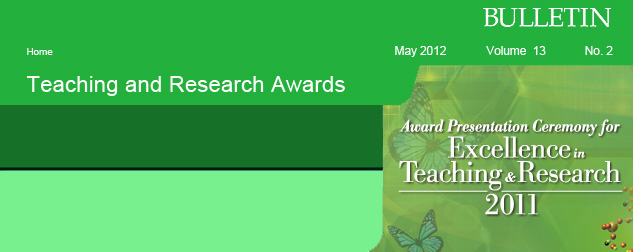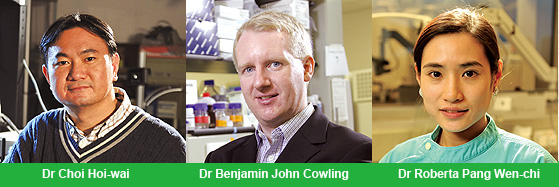| Exceptional academic staff aged under 40 and ranked Associate Professor or below are recognised with this award. |
| Outstanding Young Researcher Award |

|
|
Dr Choi Hoi-wai Department of Electrical and Electronic EngineeringUnwavering perseverance and determination are the pillars of Dr Choi’s research. In today’s environmentally-conscious world he sees it as only sensible to be developing electrical appliances that use less energy and one of the main aims of his current research is to develop solid-state lighting based on semi-conductor light-emitting devices that will promise substantial energy savings. “My passion for research into light-emitting devices originated from my passion for lasers,” states Dr Choi. He passes his own enthusiasm on to his students, countering the more mundane aspects of detailed research with an unflagging optimism and innovative problem-solving. “He always has a novel idea to tackle difficulties and challenges,” says PhD student Li Kwai-hei. At HKU’s Semiconductor Lighting and Display Laboratory, which Dr Choi established, he leads a team of researchers investigating frontier research topics including optical micro-cavities, nanophotonics, micro-displays and laser micromachining. “While conducting research is undoubtedly a pain-staking process,” says Dr Choi, “it is also a discovery into the unknown. Research is about innovation, passion and perseverance and about finding solutions nobody has ever thought of rather than an extension of existing solutions.” Dr Benjamin John Cowling School of Public HealthThe epidemiology of influenza and other respiratory viruses is at the heart of Dr Cowling’s research. He and his research team have scrutinised how easily influenza viruses can spread in households, and the efficacy of measures to reduce transmission such as face-masks and improved hygiene. “I’m interested in studying infectious diseases because they are all around us all the time,” he explains. “Things like influenza can appear very quickly.” “It’s terrible to think that these diseases can strike so suddenly and so severely, and that’s what fascinates me about researching infections.” His recent research has focused on the effectiveness of influenza vaccines in children, and the complex transmission dynamics of the different respiratory viruses that continually circulate in Hong Kong. “Infectious diseases are changing all the time, and we need to work hard to keep up with them,” says Dr Cowling, “and we are now trying hard to find more ways that we can reduce their impact and do more to reduce the spread of different kinds of diseases.” Dr Roberta Pang Wen-chi Department of SurgeryIf you’re looking for a nine-to-five job, don’t go into research – that is Dr Pang’s advice to new research students. “You have to expect very long work hours and sometimes those hours might not result in anything.” Sometime they do however, and Dr Pang has experienced considerable success in her research area – cancer, particularly of the liver and colon. She published the first study to identify a population of cancer stem cells (CSCs) with metastatic properties from human cancer, which could accurately predict the development of metastasis in colorectal cancer patients. She has also established close collaborations with several major pharmaceutical companies to design pre-clinical studies testing novel compounds for the treatment of cancer. A lot of research is teamwork and Dr Pang counts herself “very lucky to have very good students and very good research assistants to support my work. We as a team work together to come up with very good ideas and very good research.” She hopes that her research on CSCs will help improve the diagnosis and management of cancer patients, and may contribute to efforts to ultimately conquer cancer.
|
| Back | Next |
